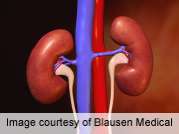(HealthDay) -- For patients with chronic kidney disease (CKD), those with metabolic syndrome (MetS) have increased arterial stiffness but no increase in endothelial dysfunction, compared to those without MetS, according to a study published online May 29 in Diabetes Care.
Pajaree Lilitkarntakul, M.D., from the University of Edinburgh in the United Kingdom, and colleagues assessed carotid-femoral pulse wave velocity (CF-PWV) and flow-mediated dilation (FMD) as measures of arterial stiffness and endothelial dysfunction, respectively, in 113 minimally comorbid CKD patients and 23 matched controls.
The researchers found that there were significant associations for systolic blood pressure (SBP), waist circumference, and plasma glucose with CF-PWV (r², 0.25, 0.09, and 0.09, respectively). FMD was significantly associated with both SBP and waist circumference (r², 0.09 and 0.03, respectively). As the number of risk factors for MetS increased, CF-PWV increased progressively (r² = 0.07). Independent determinants for CF-PWV were SBP and waist circumference, but only SBP predicted FMD.
"CKD patients with MetS have increased arterial stiffness compared with those without MetS but no difference in endothelial function," the authors write. "Although blood pressure remains the strongest determinant of both arterial stiffness and endothelial dysfunction, the presence of MetS or its risk factors is also an important determinant of arterial stiffness in this CKD cohort."
More information:
Abstract
Full Text (subscription or payment may be required)
Journal information: Diabetes Care
Copyright © 2012 HealthDay. All rights reserved.


















